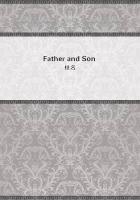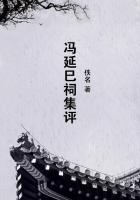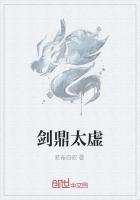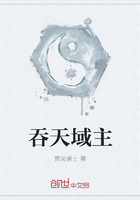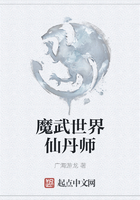The words were hardly out of his mouth when he saw the flash of Orlanduccio's gun, and almost at the same instant a second shot rang out on his left from the other side of the path, fired by a man whom he had not noticed, and who was aiming at him from behind another wall. Both bullets struck him. The first, Orlanduccio's, passed through his left arm, which Orso had turned toward him as he aimed.
The second shot struck him in the chest, and tore his coat, but coming in contact with the blade of his dagger, it luckily flattened against it, and only inflicted a trifling bruise. Orso's left arm fell helpless at his side, and the barrel of his gun dropped for a moment, but he raised it at once, and aiming his weapon with his right hand only, he fired at Orlanduccio. His enemy's head, which was only exposed to the level of the eyes, disappeared behind the wall. Then Orso, swinging round to the left, fired the second barrel at a man in a cloud of smoke whom he could hardly see. This face likewise disappeared. The four shots had followed each other with incredible swiftness; no trained soldiers ever fired their volleys in quicker succession. After Orso's last shot a great silence fell. The smoke from his weapon rose slowly up into the sky. There was not a movement, not the slightest sound from behind the wall. But for the pain in his arm, he could have fancied the men on whom he had just fired had been phantoms of his own imagination.
Fully expecting a second volley, Orso moved a few steps, to place himself behind one of the burned trees that still stood upright in the /maquis/. Thus sheltered, he put his gun between his knees, and hurriedly reloaded it. Meanwhile his left arm began to hurt him horribly, and felt as if it were being dragged down by a huge weight.
What had become of his adversaries? He could not understand. If they had taken to flight, if they had been wounded, he would certainly have heard some noise, some stir among the leaves. Were they dead, then?
Or, what was far more likely, were they not waiting behind their wall for a chance of shooting at him again. In his uncertainty, and feeling his strength fast failing him, he knelt down on his right knee, rested his wounded arm upon the other, and took advantage of a branch that protruded from the trunk of the burned tree to support his gun. With his finger on the trigger, his eye fixed on the wall, and his ear strained to catch the slightest sound, he knelt there, motionless, for several minutes, which seemed to him a century. At last, behind him, in the far distance, he heard a faint shout, and very soon a dog flew like an arrow down the slope, and stopped short, close to him, wagging its tail. It was Brusco, the comrade and follower of the bandits--the herald, doubtless, of his master's approach. Never was any honest man more impatiently awaited. With his muzzle in the air, and turned toward the nearest fence, the dog sniffed anxiously. Suddenly he gave vent to a low growl, sprang at a bound over the wall, and almost instantly reappeared upon its crest, whence he gazed steadily at Orso with eyes that spoke surprise as clearly as a dog's may do it. Then he sniffed again, this time toward the other inclosure, the wall of which he also crossed. Within a second he was back on the top of that, with the same air of astonishment and alarm, and straightway he bounded into the thicket with his tail between his legs, still gazing at Orso, and retiring from him slowly, and sideways, until he had put some distance between them. Then off he started again, tearing up the slope almost as fast as he had come down it, to meet a man, who, in spite of its steepness, was rapidly descending.
"Help, Brando!" shouted Orso, as soon as he thought he was within hearing.
"Hallo! Ors' Anton'! are you wounded?" inquired Brandolaccio, as he ran up panting. "Is it in your body or your limbs?"
"In the arm."
"The arm--oh, that's nothing! And the other fellow?"
"I think I hit him."
Brandolaccio ran after the dog to the nearest field and leaned over to look at the other side of the wall, then pulling off his cap--"Signor Orlanduccio, I salute you!" said he, then turning toward Orso, he bowed to him, also, gravely.
"That," he remarked, "is what I call a man who has been properly done for."
"Is he still alive?" asked Orso, who could hardly breathe.
"Oh! he wouldn't wish it! he'd be too much vexed about the bullet you put into his eye! Holy Madonna! What a hole! That's a good gun, upon my soul! what a weight! That spatters a man's brains for you! Hark ye, Ors' Anton'! when I heard the first /piff, piff/, says I to myself:
'Dash it, they're murdering my lieutenant!' Then I heard /boum, boum/.
'Ha, ha!' says I, 'that's the English gun beginning to talk--he's firing back.' But what on earth do you want with me, Brusco?"
The dog guided him to the other field.
"Upon my word," cried Brandolaccio, utterly astonished, "a right and left, that's what it is! Deuce take it! Clear enough, powder must be dear, for you don't waste it!"
"What do you mean, for God's sake?" asked Orso.

